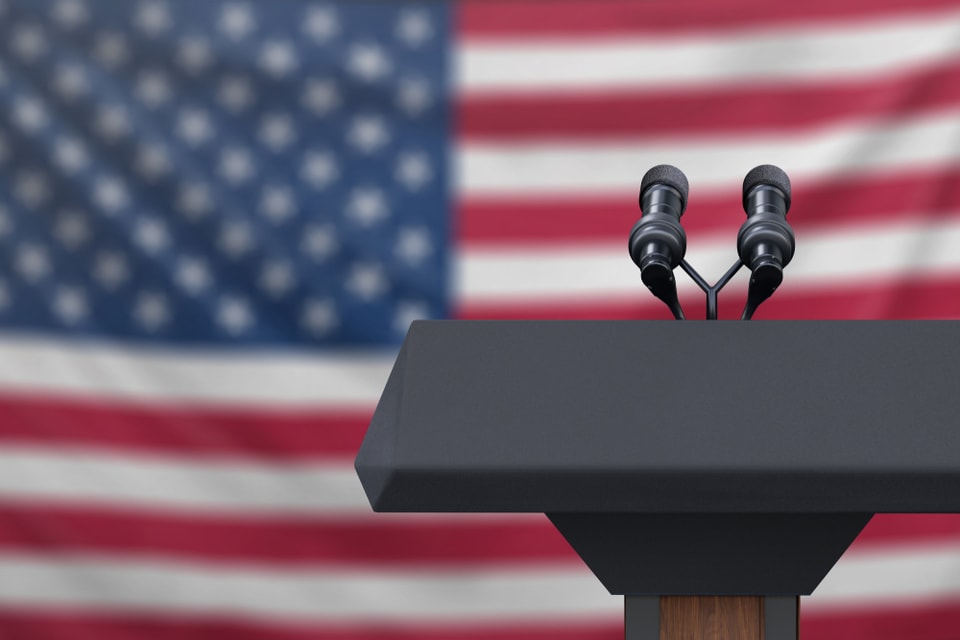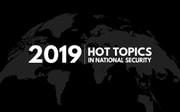Talking Points Published June 3, 2019 · 18 minute read
Talking Points for the Top National Security Issues of 2019
Mieke Eoyang, Allison Peters, Brandon Gaskew, & Ishan Mehta

During the 2020 election cycle, candidates and elected officials must be prepared to answer tough questions about a variety of national security and foreign policy concerns facing the United States. In particular, recent polling has indicated foreign cyberattacks are now the top policy priority for those Americans surveyed. Policymakers and candidates will need to be prepared to discuss how they will address this and other national security and foreign policy issues affecting the United States.
In this memo, we provide short talking points on the most pressing questions likely to be asked of candidates on these issues. Each of these answers is designed to acknowledge the legitimate concerns of Americans, explain any criticisms with current approaches and policies, and present a vision for the future.
This memo includes talking points on: 1. Russia, 2. terrorism, 3. domestic extremism, 4. China, 5. trade, 6. Iran, 7. election security, 8. the Mueller Report, 9. Saudi Arabia, 10. Syria, 11. America’s allies, 12. North Korea, 13. cyber threats, 14. Venezuela, 15. Afghanistan, 16. forever war, 17. border security, and 18. defense spending. More background on many of these issues can be found in Third Way’s 2019 Hot Topics in National Security book.
#1 Russia
Q: What should we do about Russia?
Putin conceived and executed a plan to destabilize our elections, and he succeeded. Putin ordered the assassinations of his enemies on western soil, and he got away with it. Putin is waging cyberattacks on America and our western allies, and it is working. And we have a President who denies all of it. Putin’s Russia has always feared the example that American democracy and leadership sets in the world. They have a plan to weaken America from within and divide us from our allies. To defeat Russia, we have to restore what is best about America. 1) We need to show that our elections work to reflect the will of the people — as they did in 2018. 2) We need to reassure our allies that we still support our shared values — not cozy up to dictators and autocrats. 3) We must show the Russians what a government *for* the people, not the oligarchs, looks like. Russia will fail if we restore our democracy, and rebuild our alliances. 4) We need to renew and strengthen economic sanctions against Russia. On every one of these steps, our President is on the other side.
#2 Terrorism
Q: How do we protect the nation against terrorists?
We will always take terrorism very seriously. And we have come a long way since 9/11, improving the ability of our law enforcement and military to identify, track, and eliminate terrorist threats. Working with our allies, we have set up intelligence sharing networks to warn us of plots against Americans both at home and abroad. But President Trump is damaging those networks — both with his sloppy handling of intelligence information and also by picking unnecessary fights with our allies. We cannot fight terrorism alone, but that’s exactly what Trump would have us do. To keep the nation safe from terrorism, we need to ensure our friends are with us.
#3 Domestic Extremism
Q: The United States has seen a wave of violent attacks perpetrated by individuals with far right-wing leanings that many argue should be labeled domestic terrorism, such as the 2018 shooting at a Pittsburgh synagogue. What should we do to combat this threat to Americans?
We should all be concerned about the number of attacks committed by right-wing extremists in this country that have surged under the presidency of Donald Trump. They see Trump as an ally, not an adversary in their bid to spread hate and terror. Make no mistake, under a Democratic president that will end. To start, the United States has established a strong approach to preventing terrorism in this country since 9/11 and we can use some of those same strategies to prevent these homegrown extremists from killing more Americans. We will restore the millions in funding Trump has cut to efforts aimed at tackling this threat. We will condemn attackers, not coddle them. And the White House will never be a place where far-right extremists find comfort. Instead, we will treat right-wing extremism as the major threat that it is and deploy all the necessary resources to combat it.
#4 China
Q: China has grown into one of America’s top competitors on a number of fronts. What should the United States be doing to ensure it can outcompete China?
Who is going to set the rules for the economy, trade, human rights, the internet, and climate – America or China? China has used its economic might to achieve its objectives in other countries, invested billions of dollars in technology development, and expanded its military in a way that poses a direct threat to America and our allies. America can remain the global leader on all of these fronts if we put the investment in to actually compete. At a time when America’s leadership is sorely required, President Trump has slashed budgets for research and development of new technology and picked unnecessary fights with our allies—who we need to push back on China. We should be propping up our regional allies like South Korea and Japan to push back on China’s growing military dominance in the region and boost our economic investments in other countries to compete with China’s. If we don’t, America risks ceding its role as a global leader to China.
#5 Trade
Q: President Trump has engaged in trade conflicts, not only with China, but also with Canada and the EU. What should we do to ensure these trade issues do not make average Americans suffer?
Under President Trump, America now has the largest trade deficit in goods in history. America’s trade deficit with China is now the largest of any bilateral trade deficit of all time. And our trade deficit with Mexico is the largest between these two nations ever. Trump’s trade policies are a disaster. Our trade war with China is driving up prices for American consumers and driving American farmers into the red. His trade policies are so bad that he again demanded billions in emergency taxpayer dollars to bailout farmers – not because of droughts, not because of floods, not because of a recession, but because of him.
#6 Iran
Q: Tensions between the United States and Iran have escalated as the United States has moved more military assets to the region and American sanctions on Iran have ratcheted back up following America’s withdrawal from the Iran deal in 2018. Given this escalating tension, what steps should now be taken in regard to America’s policy toward Iran?
The last thing Americans want is another endless conflict in the Middle East. We had a way to reduce tension with Iran while also successfully preventing the country from getting a nuclear weapon. It was the Iran nuclear deal. It was signed by Russia, China, France, the UK, Germany, the EU, the United States, and Iran – imagine how much work it was to get that group to agree. But it had two words in it that made it impossible for Trump to support it – Barack Obama’s signature. President Trump chose to rip that up, isolate us from our partners who helped to secure it, and ensure Iran starts back up its efforts to build a bomb. He owns this conflict plain and simple. The Iran deal was not perfect, but it was successful in freezing Iran’s nuclear program and provided a path to address other threats. With the help of his National Security Advisor John Bolton, the architect of the disastrous Iraq War, the President is now leading us down the path to war with Iran. The United States must quickly work to deescalate tensions and immediately return to the Iran deal that was successfully working to prevent Iran from getting a bomb.
#7 Election Security
Q: How do we protect our elections?
There’s no question that Russia interfered in the 2016 election, and they will be back in 2020. This time, Americans are forewarned. Everyone knows that we must be vigilant against further attacks except for one person: Donald Trump. To protect our elections, Congress should immediately pass election security legislation that would prohibit campaigns from accepting assistance from foreign governments, protect our state election infrastructure, and address social media influence. And in the meantime, every American can stay vigilant against fake news and make sure they get out and vote.
#8 Mueller Report
Q: What’s next with the results of the Mueller Investigation?
Mueller made clear in black and white and he made clear in his statement: if the President was innocent, he would’ve said so. The President was engaged in a systematic effort to obstruct an investigation into Russia’s crimes. Under DOJ rules, Mueller could not bring charges against a sitting President. But, our Constitution provides a system for accountability and oversight. Congress needs to hear from Mueller directly and see the underlying documents. There’s a lot more ground to cover in investigating this President, including looking into his finances, potential financial misdeeds and foreign influence. Once Congress has the information it needs, then it can decide how to hold the President accountable, as the Constitution requires.
#9 Saudi Arabia
Q: Saudi Arabia has been accused of murdering a Washington Post journalist and causing a humanitarian crisis in Yemen, yet the country has been a partner to the United States in its fight against terrorism. How should the United States approach its relationship to Saudi Arabia moving forward and should we take any action to punish the country for its recent actions?
Americans want to know that their hard-earned taxpayer dollars are not going to countries that are committing horrific abuses against innocent people. We have the ability to hold these countries accountable. While Saudi Arabia has been a close security partner of ours, the country is going down a dangerous and destabilizing path. It has been responsible for military operations in Yemen that have claimed the lives of thousands of innocent civilians and left millions more starving, the brutal murder of journalist and US resident Jamal Khashoggi, and many other horrifying actions. And they’ve done all of this while receiving a tremendous amount of US assistance. Instead of demanding accountability, President Trump has doubled down on his support for the Kingdom and allowed the country to continue these actions with zero consequences. America must re-evaluate our relationship with Saudi Arabia, end our support for the country’s devastating military operations in Yemen, and demonstrate to Saudi leaders that America will not allow them to operate with impunity on our dime when they continue to commit horrific abuses.
#10 Syria
Q: Last year, President Trump ordered a withdrawal of US troops from Syria, declaring the terrorist group ISIS “defeated” there. Should the United States withdraw its troops from Syria or should they remain there?
Many Americans worry that our troops who have been deployed for nearly two decades in the fight against terrorism will never come home. I share that concern and believe it’s possible for us to reduce our military presence in places like Syria while ensuring that the country doesn’t return to an ISIS breeding ground. But President Trump’s abrupt announcement of our troop withdrawal from Syria last year is not the way to do this. The President falsely claimed ISIS was defeated when our own military assesses it still has tens of thousands of fighters left in Syria and Iraq. His announcement left our allies in the region confused and scrambling and even led our top defense official to resign in protest. Instead of withdrawing our troops with no plan in place for stabilizing Syria, we need to work with our partners in the region to increase our investment in efforts aimed at addressing the factors that led ISIS to surge in the first place. Meanwhile, as we scale back our troop deployments overseas, we must simultaneously reduce America’s bloated defense budget and invest those resources back home in things like healthcare, education, and opportunities for good-paying jobs.
#11 Allies
Q: President Trump has sharply criticized and imposed tariffs on some of America’s allies and alliances. How should the United States approach its relationship with them moving forward?
President Trump has chosen to embrace America’s adversaries like Russia and North Korea while attacking our friends. He’s labeled Canada a national security threat, attacked NATO even though it is the bedrock of US security against Russia, mocked our European allies, and vilifies Mexico daily – despite the fact many of these countries have fought and died to support us in our fight against global security threats. But we can rebuild these relationships and invest in the important alliances that keep our country safe and secure—it’s possible. We need to mend these relationships immediately and return to the partnerships and agreements that keep us protected.
#12 North Korea
Q: President Trump has continued to negotiate with North Korean leader Kim Jong Un even though the North Koreans continue to build up their nuclear program. How should the United States be dealing with North Korea moving forward?
Kim Jong Un has played President Trump for a fool. North Korea’s nuclear program poses a direct threat to the United States. President Trump doesn’t seem to care. Their missiles already have the ability to reach Hawaii and the West Coast. They tested a short-range missile just as Trump was about to visit Japan. Trump congratulated him, knocked the legs out of his own National Security Advisor, embarrassed the Prime Minister of Japan, and then played golf. Negotiations are the best way to reduce this threat but President Trump has already given more and gotten less than any American President in talks with the North Koreans. His summits with Kim Jong Un have only resulted in vague promises of denuclearization that the North has already broken while Trump continues to shower the brutal dictator Kim Jong Un with praise. Instead of continuing to give Kim Jong Un any more summits, American diplomats should be working to craft a smart and tough deal with North Korea that includes strong and transparent mechanisms to ensure North Korea is not able to cheat on any deal and eliminate their capability to build a bomb.
#13 Cyber Threats
Q: Cyberattacks are now one of the biggest national security threats facing the United States. What should the United States be doing to combat this threat?
We are facing a massive cybercrime wave in this country and the bad actors are largely getting away with it. An estimated only 3 in 1000 cyber incidents result in an arrest despite the fact that cyberattacks are hitting our cities, our people, and our businesses every day. Unfortunately, the President has demonstrated that he does not take this threat seriously. He refuses to acknowledge Russia’s interference in the last presidential election or criticize the country for its cybercrimes against the United States and our allies. His lack of leadership is leaving us vulnerable to more attacks. We must seriously invest in efforts to impose consequences on malicious actors in cyberspace. We can and must ensure that we do more to stop, identify, and punish these criminals responsible. And we can do this by boosting investment in law enforcement efforts against cybercriminals, and building partnerships with our international allies and the private sector in order to protect Americans online.
#14 Venezuela
Q: Venezuela is in the midst of a political and humanitarian crisis that has led the United States to recognize Juan Guaido as the country’s legitimate leader and call on President Nicolas Maduro to step down. What steps should the United States be taking to stabilize Venezuela, and should that include any use of military force?
The crisis in Venezuela is extremely concerning given how close it is to us, but many of us are equally concerned that President Trump will involve our military in yet another conflict to try to solve it. The United States can support the Venezuela people and push for fair elections without placing American troops on the ground. Sadly, our President doesn’t appear to have a clear strategy for how to do this and instead has continued to demean, criticize, and isolate us from the very allies we need in the region to help end this crisis. The United States should be working with these countries to push for free and open democratic elections, so the people of Venezuela can elect their leader. We should also urgently focus on providing humanitarian assistance in the country and help those who have already fled and are in need.
#15 Afghanistan
Q: The United States is currently negotiating an end to the over 17 years of conflict in Afghanistan between America and the Taliban. If such a deal is secured, what should the United States presence in the country look like?
After more than 17 years in Afghanistan, the American public is tired of endless war. A peace agreement that allows us to bring our troops home, facilitates the Afghans in negotiating peace amongst themselves, and ensures the country does not return to a terrorist safe haven is what the United States should be working toward. But the Trump administration’s current strategy appears to rest solely on the objective of withdrawing our troops once a peace deal is reached with the Taliban instead of also considering what we need to do to ensure terrorist groups don’t once again have free rein there to plot attacks against the United States. The President has gutted the other tools we have in our arsenal like foreign aid to support efforts aimed at ensuring this doesn’t happen. If a deal with the Taliban is reached, we should work to bring our troops home as soon as possible while boosting our investments in other areas that prevent terrorists from having a safe haven in Afghanistan.
#16 Forever War
Q: We’ve deployed hundreds of thousands of troops around the globe to fight terrorism using a war authorization that Congress passed 17 years ago. Should the United States scale back this endless war and how should that be done?”
After 9/11, Congress authorized the President to use force against those who attacked us. More than 17 years later we are now fighting terrorist groups around the world who have no connection to 9/11 with the same legal authority. The United States should go after terrorist groups who want to harm Americans and our allies, but we need a more transparent process to clarify how decisions are being made to deploy our troops. President Trump now appears to be gearing up to use the same legal authorities passed to go after the 9/11 attackers to go to war with Iran, which would be a disaster. The next president should work with Congress to reassert its oversight over where America is deploying its troops, limit the potential for unilateral action, and encourage the series of checks and balances on presidential military authority intended by the Founding Fathers.
#17 Border Security
Q: President Trump has said that migrants arriving at the U.S.-Mexico border are taking advantage of America’s laws and weak border security to come into the United States. From the building the border wall to increased immigration enforcement, he has made border security central to his presidency, which many Democrats have opposed. Should stronger border security measures be put in place?
President Trump has claimed that the US border is being overwhelmed. While it’s true we face real challenges at the southern border, we need to meet those challenges with proven and sensible solutions. Over the past 10 years, we have spent $150 billion dollars, deployed 20,000 border agents, and apprehended 4 million people trying to illegally enter the country through Mexico. We don’t have open borders. The Trump administration’s draconian policies from tearing children from their parents to building a wall simply aren’t the answer. I support a bipartisan plan to strengthen border security and create an earned pathway to citizenship for undocumented immigrants if they keep out of trouble, work hard, learn English, and pay taxes.
#18 Defense Spending
Q: The United States spends over $700 billion annually on funding for our military. How much should the United States spend on defense, while also ensuring the military is prepared to defend the country from future threats?
It makes no sense that President Trump wants to increase the defense budget while claiming to end the missions in Syria and Afghanistan. Defense spending should follow mission needs. As we end wars, we should reduce budgets, not start new wars and increase budgets. Going forward, we can make our military spending more efficient by investing in the tools we need to fight the threats of today and tomorrow, not yesterday. The United States has the greatest 20th century military money can buy; we continue to invest in outdated weapons systems while ignoring the 21st century threats of today. For example, we have nearly 6,000 tanks in active service and thousands more in storage, yet this type of military equipment won’t be able to protect the country from the ever-growing threats that are coming from cyberspace. We can also reduce the burden on our military by making sure we have allies and partners by our side helping us. Unfortunately, President Trump has chosen to denigrate and attack our friends who have fought and died by America’s side while befriending dictators like Russia’s Putin and North Korea’s Kim. This does nothing to make us safer.




